六年级 句型转换
- 格式:doc
- 大小:55.50 KB
- 文档页数:9
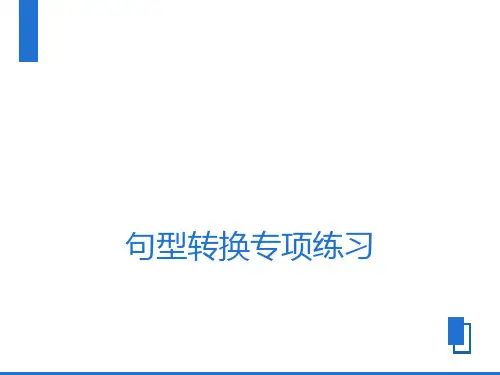
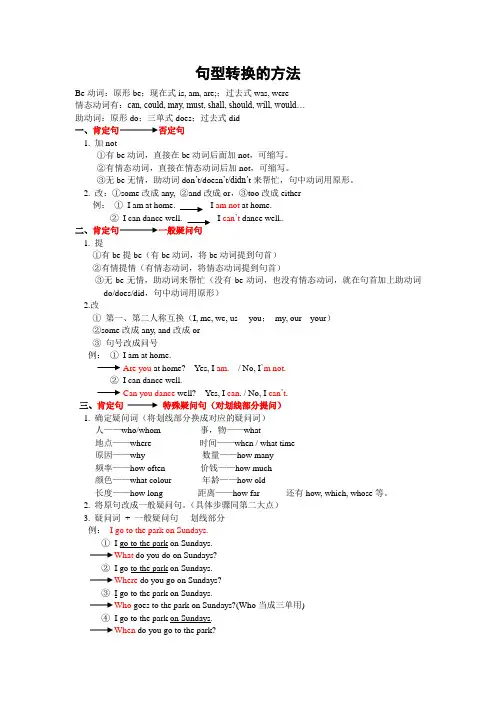
句型转换的方法Be动词:原形be;现在式is, am, are;;过去式was, were情态动词有:can, could, may, must, shall, should, will, would…助动词:原形do;三单式does;过去式did一、肯定句否定句1. 加not①有be动词,直接在be动词后面加not,可缩写。
②有情态动词,直接在情态动词后加not,可缩写。
③无be无情,助动词don’t/doesn’t/didn’t来帮忙,句中动词用原形。
2. 改:①some改成any, ②and改成or,③too改成either例:①I am at home. I am not at home.②I can dance well. I can’t dance well..二、肯定句一般疑问句1. 提①有be提be(有be动词,将be动词提到句首)②有情提情(有情态动词,将情态动词提到句首)③无be无情,助动词来帮忙(没有be动词,也没有情态动词,就在句首加上助动词do/does/did,句中动词用原形)2.改①第一、第二人称互换(I, me, we, us ---you;my, our---your)②some改成any, and改成or③句号改成问号例:①I am at home.Are you at home? Yes, I am. / No, I’m not.②I can dance well.Can you dance well? Yes, I can. / No, I can’t.三、肯定句特殊疑问句(对划线部分提问)1. 确定疑问词(将划线部分换成对应的疑问词)人——who/whom 事,物——what地点——where 时间——when / what time原因——why 数量——how many频率——how often 价钱——how much颜色——what colour 年龄——how old长度——how long 距离——how far 还有how, which, whose等。
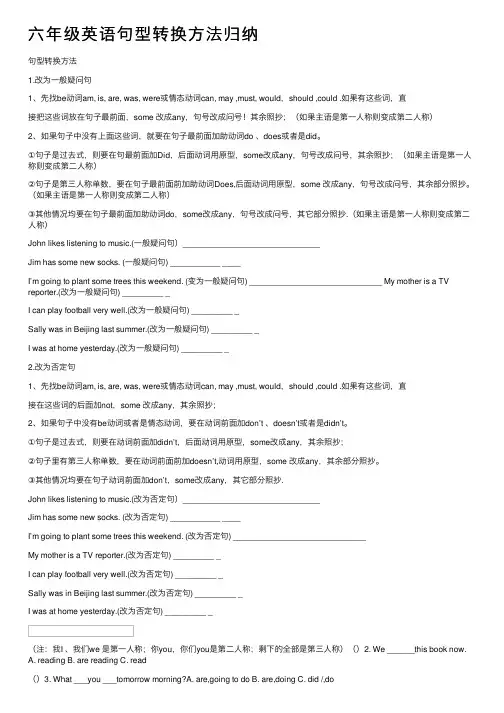
六年级英语句型转换⽅法归纳句型转换⽅法1.改为⼀般疑问句1、先找be动词am, is, are, was, were或情态动词can, may ,must, would,should ,could .如果有这些词,直接把这些词放在句⼦最前⾯,some 改成any,句号改成问号!其余照抄;(如果主语是第⼀⼈称则变成第⼆⼈称)2、如果句⼦中没有上⾯这些词,就要在句⼦最前⾯加助动词do 、does或者是did。
①句⼦是过去式,则要在句最前⾯加Did,后⾯动词⽤原型,some改成any,句号改成问号,其余照抄;(如果主语是第⼀⼈称则变成第⼆⼈称)②句⼦是第三⼈称单数,要在句⼦最前⾯前加助动词Does,后⾯动词⽤原型,some 改成any,句号改成问号,其余部分照抄。
(如果主语是第⼀⼈称则变成第⼆⼈称)③其他情况均要在句⼦最前⾯加助动词do,some改成any,句号改成问号,其它部分照抄.(如果主语是第⼀⼈称则变成第⼆⼈称)John likes listening to music.(⼀般疑问句)______________________________Jim has some new socks. (⼀般疑问句) ___________ ____I’m going to plant some trees this weekend. (变为⼀般疑问句) _____________________________ My mother is a TV reporter.(改为⼀般疑问句) _________ _I can play football very well.(改为⼀般疑问句) _________ _Sally was in Beijing last summer.(改为⼀般疑问句) _________ _I was at home yesterday.(改为⼀般疑问句) _________ _2.改为否定句1、先找be动词am, is, are, was, were或情态动词can, may ,must, would,should ,could .如果有这些词,直接在这些词的后⾯加not,some 改成any,其余照抄;2、如果句⼦中没有be动词或者是情态动词,要在动词前⾯加don’t 、doesn’t或者是didn’t。
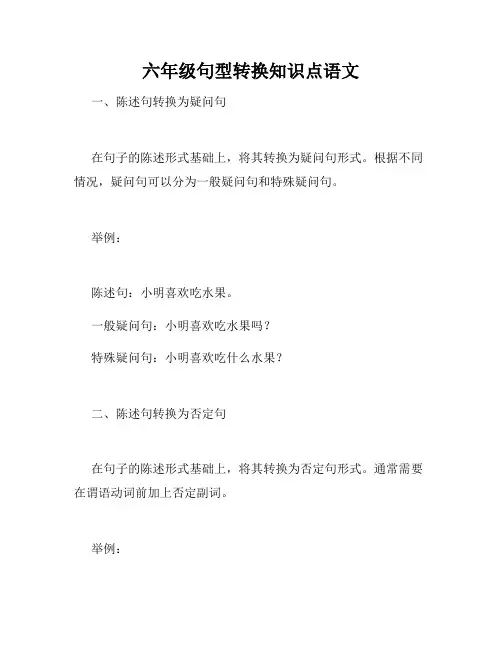
六年级句型转换知识点语文一、陈述句转换为疑问句在句子的陈述形式基础上,将其转换为疑问句形式。
根据不同情况,疑问句可以分为一般疑问句和特殊疑问句。
举例:陈述句:小明喜欢吃水果。
一般疑问句:小明喜欢吃水果吗?特殊疑问句:小明喜欢吃什么水果?二、陈述句转换为否定句在句子的陈述形式基础上,将其转换为否定句形式。
通常需要在谓语动词前加上否定副词。
举例:陈述句:我喜欢吃冰淇淋。
否定句:我不喜欢吃冰淇淋。
三、肯定句转换为选择疑问句在句子的肯定形式基础上,将其转换为选择疑问句形式。
通常需要在末尾加上"还是",并提供两个或多个选项供选择。
举例:肯定句:我明天要去图书馆学习。
选择疑问句:我明天要去图书馆学习,还是去游乐场玩?四、一般疑问句转换为特殊疑问句在一般疑问句的基础上,将其转换为特殊疑问句形式。
通常需要将疑问词(如何、为什么、哪里等)引导的部分提到句首。
举例:一般疑问句:你想吃什么?特殊疑问句:吃什么你想?五、陈述句转换为感叹句在句子的陈述形式基础上,将其转换为感叹句形式。
通常需要在句首加上感叹词。
举例:陈述句:今天天气真好!感叹句:多么好的天气啊!六、肯定句转换为祈使句在句子的肯定形式基础上,将其转换为祈使句形式。
通常需要将句子的主语省略,并将谓语动词原形进行调整。
举例:肯定句:你去打开窗户。
祈使句:打开窗户。
以上就是六年级句型转换的一些知识点,通过对句子形式的转换,我们可以更灵活地运用句型,丰富我们的表达方式。
切记要在语文学习中多进行实践和练习,加深对句型转换知识的理解和掌握,提升自己的语文表达能力。
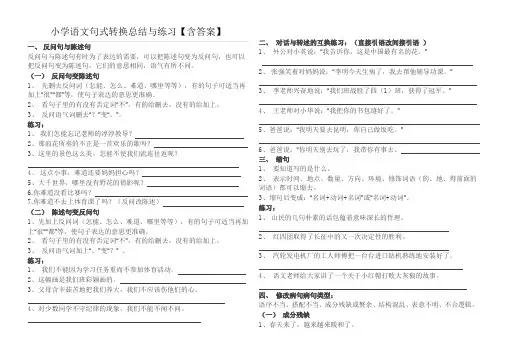
小学语文句式转换总结与练习【含答案】一、反问句与陈述句反问句与陈述句有时为了表达的需要,可以把陈述句变为反问句,也可以把反问句变为陈述句,它们的意思相同,语气有所不同。
(一)反问句变陈述句1、先删去反问词(怎能、怎么、难道、哪里等等),有的句子可适当再加上“很”“都”等,使句子表达的意思更准确。
2、看句子里的有没有否定词“不”,有的给删去,没有的给加上。
3、反问语气词删去“?”变“。
”。
练习:1、我们怎能忘记老师的淳淳教导?2、那浪花所奏的不正是一首欢乐的歌吗?3、这里的景色这么美,怎能不使我们流连往返呢?4、这点小事,难道还要妈妈担心吗?5、大千世界,哪里没有野花的倩影呢?6.你难道没看比赛吗?7.你难道不去上体育课了吗?(反问改陈述)(二)陈述句变反问句1、先加上反问词(怎能、怎么、难道、哪里等等),有的句子可适当再加上“很”“都”等,使句子表达的意思更准确。
2、看句子里的有没有否定词“不”,有的给删去,没有的给加上。
3、反问语气词加上“。
”变“?” 。
练习:1、我们不能因为学习任务重而不参加体育活动。
2、这幅画是我们班彩颖画的。
3、父母含辛茹苦地把我们养大,我们不应该伤他们的心。
4、对少数同学不守纪律的现象,我们不能不闻不问。
二、对话与转述的互换练习:(直接引语改间接引语)1、外公对小英说:“我告诉你,这是中国最有名的花。
”2、张强笑着对妈妈说:“李明今天生病了,我去帮他辅导功课。
”3、李老师兴奋地说:“我们班战胜了四(1)班,获得了冠军。
”4、王老师对小华说:“我把你的书包缝好了。
”5、爸爸说:“我明天要去昆明,你自己做饭吃。
”6、爸爸说:“你明天别去玩了,我带你有事去。
三、缩句1、要知道写的是什么。
2、表示时间、地点、数量、方向、环境、修饰词语(的、地、得前面的词语)都可以缩去。
3、缩句后变成:“名词+动词+名词”或“名词+动词”。
练习:1、山民的几句朴素的话包蕴着意味深长的哲理。
2、红四团取得了长征中的又一次决定性的胜利。
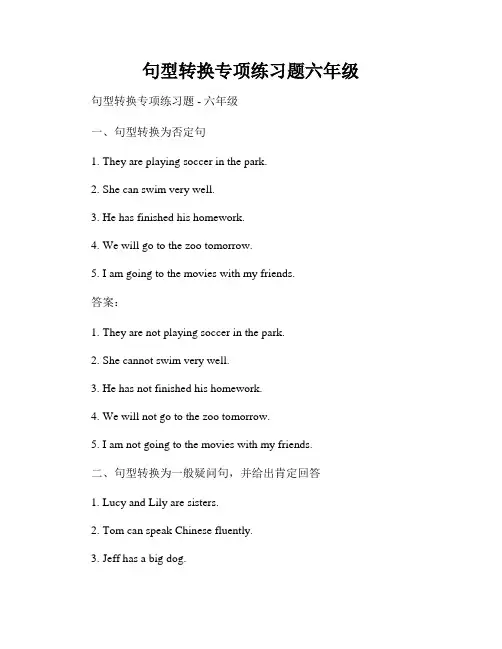
句型转换专项练习题六年级句型转换专项练习题 - 六年级一、句型转换为否定句1. They are playing soccer in the park.2. She can swim very well.3. He has finished his homework.4. We will go to the zoo tomorrow.5. I am going to the movies with my friends.答案:1. They are not playing soccer in the park.2. She cannot swim very well.3. He has not finished his homework.4. We will not go to the zoo tomorrow.5. I am not going to the movies with my friends.二、句型转换为一般疑问句,并给出肯定回答1. Lucy and Lily are sisters.2. Tom can speak Chinese fluently.3. Jeff has a big dog.4. They will visit their grandparents next week.5. We are going to have a picnic this Sunday.答案:1. Are Lucy and Lily sisters? - Yes, they are.2. Can Tom speak Chinese fluently? - Yes, he can.3. Does Jeff have a big dog? - Yes, he does.4. Will they visit their grandparents next week? - Yes, they will.5. Are we going to have a picnic this Sunday? - Yes, we are.三、句型转换为选择疑问句1. John likes basketball.2. She is reading a book.3. They went to the park yesterday.4. Mary can play the piano.5. It is raining outside.答案:1. Does John like basketball or soccer?2. Is she reading a book or watching TV?3. Did they go to the park yesterday or the day before yesterday?4. Can Mary play the piano or the guitar?5. Is it raining outside or is it sunny?四、句型转换为反意疑问句1. You are going to the party, aren't you?2. He doesn't like ice cream, does he?3. She likes to play soccer, doesn't she?4. They have finished their homework, haven't they?5. We won't be late, will we?答案:1. You are going to the party, aren't you?2. He doesn't like ice cream, does he?3. She likes to play soccer, doesn't she?4. They have finished their homework, haven't they?5. We won't be late, will we?五、句型转换为完成时态1. They swim in the pool every day.2. She sings a song at the concert.3. He wears a red shirt to school.4. We eat lunch at 12 o'clock.5. I play soccer with my friends after school.答案:1. They have swum in the pool every day.2. She has sung a song at the concert.3. He has worn a red shirt to school.4. We have eaten lunch at 12 o'clock.5. I have played soccer with my friends after school.总结:通过以上的句型转换专项练习题,我们可以提升学生们对不同句型的理解和应用能力。
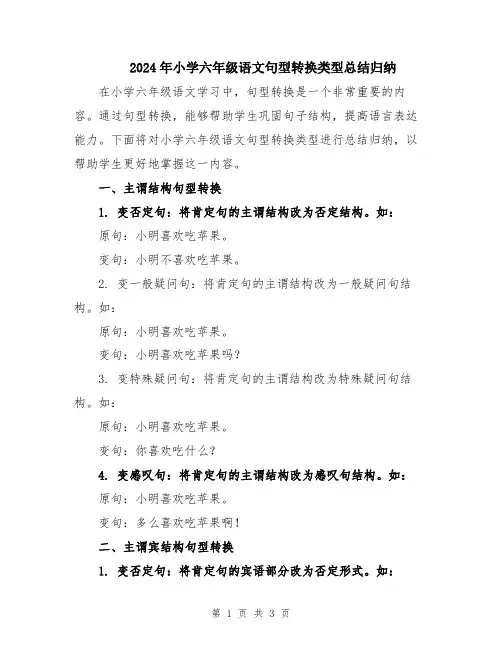
2024年小学六年级语文句型转换类型总结归纳在小学六年级语文学习中,句型转换是一个非常重要的内容。
通过句型转换,能够帮助学生巩固句子结构,提高语言表达能力。
下面将对小学六年级语文句型转换类型进行总结归纳,以帮助学生更好地掌握这一内容。
一、主谓结构句型转换1. 变否定句:将肯定句的主谓结构改为否定结构。
如:原句:小明喜欢吃苹果。
变句:小明不喜欢吃苹果。
2. 变一般疑问句:将肯定句的主谓结构改为一般疑问句结构。
如:原句:小明喜欢吃苹果。
变句:小明喜欢吃苹果吗?3. 变特殊疑问句:将肯定句的主谓结构改为特殊疑问句结构。
如:原句:小明喜欢吃苹果。
变句:你喜欢吃什么?4. 变感叹句:将肯定句的主谓结构改为感叹句结构。
如:原句:小明喜欢吃苹果。
变句:多么喜欢吃苹果啊!二、主谓宾结构句型转换1. 变否定句:将肯定句的宾语部分改为否定形式。
如:原句:小明买了一本书。
变句:小明没买书。
2. 变一般疑问句:将肯定句的主语和宾语部分改为一般疑问句结构。
如:原句:小明买了一本书。
变句:小明买书了吗?3. 变特殊疑问句:将肯定句的主语和宾语部分改为特殊疑问句结构。
如:原句:小明买了一本书。
变句:你买了什么书?4. 变感叹句:将肯定句的宾语部分改为感叹句结构。
如:原句:小明买了一本书。
变句:小明买了多好的书啊!三、主谓宾补结构句型转换1. 变否定句:将肯定句的宾语补足语部分改为否定形式。
如:原句:小明认为这本书很有意思。
变句:小明认为这本书不有意思。
2. 变一般疑问句:将肯定句的主语和宾语补足语部分改为一般疑问句结构。
如:原句:小明认为这本书很有意思。
变句:小明认为这本书有意思吗?3. 变特殊疑问句:将肯定句的主语和宾语补足语部分改为特殊疑问句结构。
如:原句:小明认为这本书很有意思。
变句:你认为这本书有什么意思?4. 变感叹句:将肯定句的宾语补足语部分改为感叹句结构。
如:原句:小明认为这本书很有意思。
变句:小明认为这本书有多有意思啊!四、主谓宾宾补结构句型转换该类型的句型转换相对较复杂,需要根据具体情况进行分析和转换。

小学六年级英语句型转换方法归纳大全如:Do you like English?Does he speak Chinese?Did they finish their homework?第二步:将句子中的主语放在be动词或情态动词或助动词后面,动词用原形。
如:Do you like English?Does he speak Chinese?Did they finish their homework?第三步:在句子末尾加问号。
如:Do you like English?Does he speak Chinese?Did they finish their homework?三、肯定句改祈使句——两步法第一步:将句子中的主语you省略。
如:Study hard.→Hard.XXX.→Quiet.第二步:在句子末尾加上句号或感叹号。
如:Study hard.Be quiet!Original article:XXX and I went to the park yesterday。
We played catch and had a ic。
The weather was nice and sunny。
We saw some kids XXX。
We had a great time.Corrected and rewritten:XXX。
my friend and I went to the park。
We played catch and had a ic on the grass。
The weather was beautiful and sunny。
While we were there。
we saw some children flying kites and some people walking their dogs。
It was a wonderful day and we had a lot of fun.When forming a n in English。
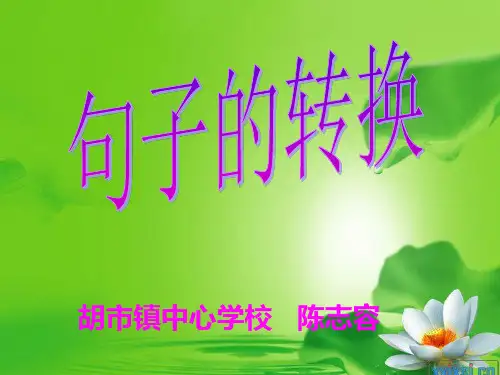
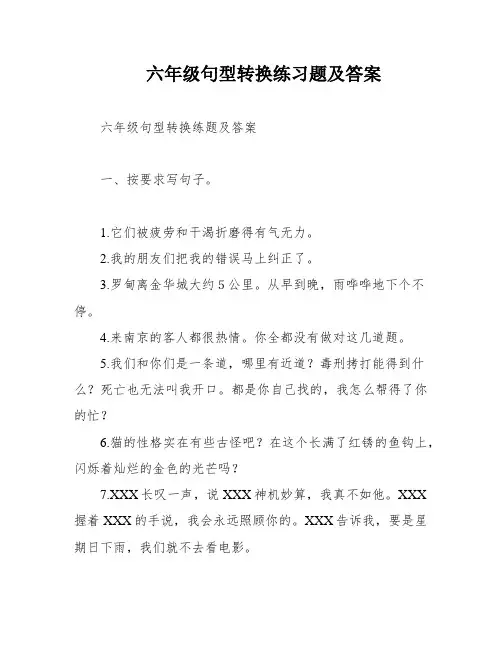
六年级句型转换练习题及答案六年级句型转换练题及答案一、按要求写句子。
1.它们被疲劳和干渴折磨得有气无力。
2.我的朋友们把我的错误马上纠正了。
3.罗甸离金华城大约5公里。
从早到晚,雨哗哗地下个不停。
4.来南京的客人都很热情。
你全都没有做对这几道题。
5.我们和你们是一条道,哪里有近道?毒刑拷打能得到什么?死亡也无法叫我开口。
都是你自己找的,我怎么帮得了你的忙?6.猫的性格实在有些古怪吧?在这个长满了红锈的鱼钩上,闪烁着灿烂的金色的光芒吗?7.XXX长叹一声,说XXX神机妙算,我真不如他。
XXX 握着XXX的手说,我会永远照顾你的。
XXX告诉我,要是星期日下雨,我们就不去看电影。
8.妈妈严肃地对我说,马上就要期末考试了,我一定要认真复,不要辜负老师和她对我的一片期望。
二、照样子写句子。
1.XXX推开门走进教室。
2.夜空的繁星,仿佛碧波上撒满的宝石。
3.井冈山是中国革命的摇篮。
4、敌人使用燃烧弹,XXX周围的一切都被火海所覆盖。
5、天空中的星星眨巴着眼睛,显得非常活泼。
6、这些信件和报纸给千家万户带来了希望、欢乐和温暖,让人们感到心情舒畅。
一、按要求写句子。
1、疲劳和干渴把他们折磨得有气无力。
2、我朋友们把我的错误马上纠正了。
3、大约五公里到罗甸的金华城外。
雨从早到晚不停地下个不停。
二、写句。
1、欣欣向荣①用来形容花草树木的:茂盛繁荣。
②用来比喻事业的:蒸蒸日上。
2、骄傲①用来表示褒义的:自豪。
②用来表示贬义的:自满。
3、成了比喻句:他已经变成了一只猪。
拟人句:它仿佛有了生命,变得活灵活现。
4、天空中的小星星拟人句:天空中的小星星在向我们眨眼睛。
5、好像比喻句:她的笑容好像阳光一样温暖。
不是比喻句:他好像很累。
6、妈妈告诉我:“我要去上班,中午你自己在家复功课。
”7、这块地里的菜秧是我种下的。
①主动句:我在这块地里种下了菜秧。
③被动句:这块地里的菜秧是我种的。
8、我们遇到困难,不能退缩。
9、这个活泼的小孩是我的好朋友。
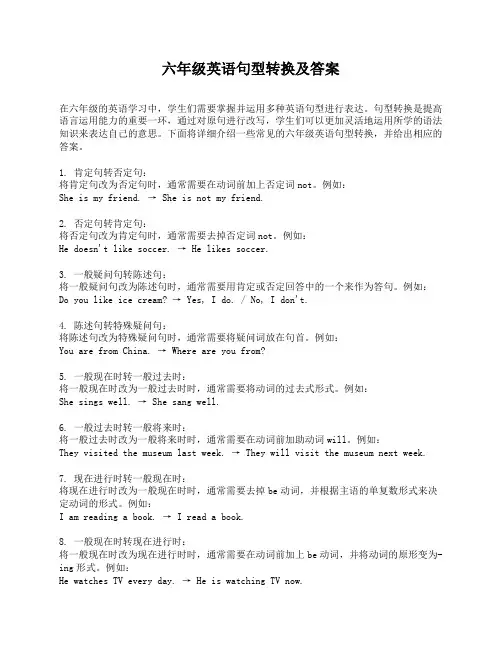
六年级英语句型转换及答案在六年级的英语学习中,学生们需要掌握并运用多种英语句型进行表达。
句型转换是提高语言运用能力的重要一环,通过对原句进行改写,学生们可以更加灵活地运用所学的语法知识来表达自己的意思。
下面将详细介绍一些常见的六年级英语句型转换,并给出相应的答案。
1. 肯定句转否定句:将肯定句改为否定句时,通常需要在动词前加上否定词not。
例如:She is my friend. → She is not my friend.2. 否定句转肯定句:将否定句改为肯定句时,通常需要去掉否定词not。
例如:He doesn't like soccer. → He likes soccer.3. 一般疑问句转陈述句:将一般疑问句改为陈述句时,通常需要用肯定或否定回答中的一个来作为答句。
例如:Do you like ice cream? → Yes, I do. / No, I don't.4. 陈述句转特殊疑问句:将陈述句改为特殊疑问句时,通常需要将疑问词放在句首。
例如:You are from China. → Where are you from?5. 一般现在时转一般过去时:将一般现在时改为一般过去时时,通常需要将动词的过去式形式。
例如:She sings well. → She sang well.6. 一般过去时转一般将来时:将一般过去时改为一般将来时时,通常需要在动词前加助动词will。
例如:They visited the museum last week. → They will visit the museum next week.7. 现在进行时转一般现在时:将现在进行时改为一般现在时时,通常需要去掉be动词,并根据主语的单复数形式来决定动词的形式。
例如:I am reading a book. → I read a book.8. 一般现在时转现在进行时:将一般现在时改为现在进行时时,通常需要在动词前加上be动词,并将动词的原形变为-ing形式。
六年级英语句型转换一、陈述句变一般疑问句.1.含有系动词(am,is,are) 或情态动词(can) 的句子变一般疑问句,首先将系动词或情态动词提到句首,然后改变大小写及标点符号。
(一、二人称要互换,即原句中的第一人称要变为第二人称,第二人称要变为第一人称)eg.(1)He is a policeman. →Is he a policeman?(2)I can do the dishes. →Can you do the dishes?2.不含系动词或情态动词的句子变一般疑问句,首先在句首加助动词Do,然后改变大小写及标点符号。
(一、二人称要互换)当句子的主语是第三人称单数时,首先在句首加助动词Does,然后将句子中的动词变为原型,最后改变大小写及标点符号。
eg. (1)I do my homework everyday. →Do you do your homework everyday?(2)She has long hair. →Does she have long hair?二、肯定句变否定句.1.含有系动词或情态动词的句子变否定句,直接在系动词或情态动词后加not。
eg. (1)There are some books on the desk. →There are not some books on the desk.(2)We can help her. →We can not help her.2.不含系动词或情态动词的句子变否定句,直接在句子的动词前加do not (don’t)。
当句子的主语是第三人称单数时,首先在句子的动词前加does not(doesn’t) 然后将句子中的动词变为原型。
eg. (1)I have an apple. →I don’t have an apple.(2)She has a sister. →She doesn’t have a sister.三、对划线部分提问的三个步骤。
(完整版)六年级语文句型转换练习
一、句子变换:改变句子谓语动词的时态
1. 他明天去参观博物馆。
(改为一般疑问句)
- 你明天去参观博物馆吗?
2. 我们昨天在公园里玩得很开心。
(改为否定句)
- 我们昨天在公园里没玩得很开心。
二、句子变换:改变句子的句式
1. 我们正在看电影。
(改为感叹句)
- 多么棒的电影我们正在看!
2. 长大后我想当一名医生。
(改为简单句)
- 我想当一名医生。
三、句子变换:改变句子的语态
1. 他们发现了一只迷路的小猫。
(改为被动语态)
- 一只迷路的小猫被他们发现了。
2. 她帮助了那位老人过马路。
(改为被动语态)
- 那位老人被她帮助过马路。
四、句子变换:改变句子的陈述方式
1. "今天天气很好,我们去郊游吧!" 师父对我们说。
(改为直引句)
- "今天天气很好,我们去郊游吧!" 师父说。
2. "你昨天看到那个新学生了吗?" 妈妈问我。
(改为间接引语)
- 妈妈问我昨天是否看到那个新学生。
五、句子变换:改变句子的语气
1. 别再想着放弃了,相信自己能行!(改为陈述句)
- 别再想着放弃了,我相信你能行。
2. 千万别告诉任何人我们的秘密。
(改为祈使句)
- 不要告诉任何人我们的秘密。
以上是六年级语文句型转换练习的完整版本。
希望对你的学习有所帮助!。
六年级练习题句型转换句型转换是六年级英语学习中的重要内容,通过练习题的形式,可以帮助学生提高句型转换的能力。
下面是一些六年级练习题句型转换的例子。
1.改写句子:They have a big house.(改为否定句)答案:They don't have a big house.2.改写句子:She will go to the park tomorrow.(改为一般疑问句)答案:Will she go to the park tomorrow?3.改写句子:He is playing football now.(改为过去进行时)答案:He was playing football at that time.4.改写句子:I can swim very well.(改为否定句)答案:I can't swim very well.5.改写句子:They have already finished the homework.(改为一般疑问句)答案:Have they already finished the homework?6.改写句子:She has lived here for three years.(改为一般疑问句)答案:Has she lived here for three years?7.改写句子:He will visit his grandparents next week.(改为否定句)答案:He won't visit his grandparents next week.8.改写句子:I bought a new book yesterday.(对划线部分提问)答案:When did you buy a new book?9.改写句子:He can speak English and French.(改为选择疑问句)答案:Can he speak English or French?10.改写句子:She lived in London for five years.(改为现在完成时)答案:She has lived in London for five years.以上是一些六年级练习题句型转换的例子,通过反复练习,学生能够更好地掌握不同句型的转换方式,提高语言表达的能力。
六年级句型转换知识点六年级学生在学习语文时,句型转换是一个重要的内容。
句型转换是指将一个句子从一种语法结构转化为另一种语法结构,通过改变句子中的句式、时态、语态、人称等要素,来表达不同的意思。
下面是一些六年级常见的句型转换知识点,希望能对大家的学习有所帮助。
1. 肯定句和否定句的转换在肯定句和否定句之间进行转换时,需要改变句子中的助动词或情态动词,并在动词前加上not。
例如:- 肯定句:She can swim.- 否定句:She cannot swim.- 肯定句:We have finished our homework.- 否定句:We have not finished our homework.2. 一般疑问句和肯定回答/否定回答的转换在一般疑问句和回答之间进行转换时,需要改变句子的语序,将谓语动词提前,并在回答中使用相应的助动词或情态动词。
例如:- 一般疑问句:Did you finish your homework?- 肯定回答:Yes, I did.- 否定回答:No, I didn't.- 一般疑问句:Can she play the piano?- 肯定回答:Yes, she can.- 否定回答:No, she can't.3. 变换时态在句子的时态转换中,需要根据需要改变动词的形式。
例如: - 现在进行时转一般现在时:He is reading a book. → He reads books.- 一般过去时转一般将来时:They visited the museum yesterday. → They will visit the mu seum.- 一般将来时转过去进行时:I will be studying at that time. → I would be studying at that time.4. 句式的转换句式的转换包括从陈述句转变为疑问句、感叹句等,或者从疑问句、感叹句转变为陈述句等。
2024年小学六年级语文句型转换类型总结归纳包括以下几种类型:
1. 平述句转疑问句:将一个平述句转换为疑问句,通常需要在句首添加疑问词或者将动词调换到主语之前。
例如:
平述句:他们去了公园。
疑问句:他们去了公园吗?
2. 直陈句转否定句:将一个直陈句转换为否定句,通常需要在句子前面加上否定副词或者将肯定的动词改为否定形式。
例如:
直陈句:我喜欢唱歌。
否定句:我不喜欢唱歌。
3. 肯定句转疑问句:将一个肯定句转换为疑问句,通常需要将句末的句号改为问号,并在句首添加疑问词或者动词调换到主语之前。
例如:
肯定句:他会来参加聚会。
疑问句:他会来参加聚会吗?
4. 疑问句转肯定句:将一个疑问句转换为肯定句,通常需要将疑问词改为肯定的形式,并将句末的问号改为句号。
例如:
疑问句:你是不是在学校?
肯定句:你是在学校。
5. 肯定句转简略答语:将一个肯定句转换为简略答语,通常需要将肯定句中的主语和助动词保留,并将动词改为缩略形式。
例如:
肯定句:他已经完成作业了。
简略答语:是的,已经完成了。
这些是常见的语文句型转换类型,通过不断的练习,可以掌握更多的句型转换技巧。
常见句型转换训练一、变一般疑问句:1.谓语动词为be 动词:(1)There is a cup of tea on the desk.Is there a cup of tea on the desk?(2)I am interested in reading.Are you interested in reading?(3)He is good at fishing.Is he good at fishing?(4)She is from China.Is she from China?(5)He is twenty years old.Is he twenty years old?(6)They are Chinese.Are they Chinese?(7)It is sunny today.Is it sunny today?(8)It is ten o’clock.Is it ten o’clock?(9)It is Sunday.Is it Sunday?(10)It is October.Is it October?(11)It is 2012.Is it 2012?(12)My name is Lily.Is your name Lily?(13)I am Lily.Are you Lily?(14)I am a student.Are you a student?(15)We are in Grade Six.Are you in Grade Six?(16)This is a new book.Is this a new book?(17)Those are my friends.Are those your friends?(18)The girl is drawing now.Is the girl drawing now?2.谓语动词部分含“助动词will, 情态动词can, should, must等”:(1)I will buy a pen.Will you buy a pen?(2)He can go to the cinema.Can he go to the cinema?(3)She should go to bed early.Should she go to bed early?(4)They must wait for the green light. (变一般疑问句,并作肯、否回答) --Must they wait for the green light?--Y es, they must. (肯)--No, they needn’t. (否)3.谓语动词为实意动词,变一般疑问句借助助动词do (does)[1]主语不是第三人称单数:(1)I always go to school at seven.Do you always go to school at seven?(2)They like swimming very much.Do they like swimming very much?(3)I have a beautiful voice.Do you have a beautiful voice?(4)We have breakfast at seven o’clock.Do you have breakfast at seven o’clock?(5)My parents go to work by car.Do your parents go to work by car?(6)Lucy and Lily enjoy playing basketball.Do Lucy and Lily enjoy playing basketball?(7)Her classmates come to school early.Do her classmates come to school early?[2]主语是第三人称单数:(1)He enjoys fishing.Does he enjoy fishing?(2)He gets up at six o’clock.Does he get up at six o’clock?(3)She has lunch at half past twelve. Does she have lunch at half past twelve?(4)It runs fast.Does it run fast?(5)Tom often goes to school by bus. Does Tom often go to school by bus? (6)Peter never goes out in the evening. Does Peter never go out in the evening?(7)The baby cries heavily.Does the baby cry heavily?(8)The toy train moves fast.Does the toy train move fast?二、变特殊疑问句:1.【wh-】1. What:(1) He likes farming.What does he like?(2) My father goes to work at eight in the morning. What does your father do at eight in the morning? (3) Her hobby is planting flowers.What is her hobby?(4) I am watching TV.What are you doing?(5) She usually goes on with her work after lunch. What does she usually do after lunch?(6) This is a bag.What is this?(7) Peter is doing his homework now.What is Peter doing now?(8) I like drawing animals.What do you like drawing?(9) I am a student.What are you?(10) It is sunny.What is the weather like? (或How is the weather?)(11) It is Friday today.What day is it today?(12) It is October 29th.What is the date?2. Who:(1) He is my father.Who is your father?(2) He is my father.Who is he?(3) Bob goes to school by car.Who goes to school by car?(4) Peter is always late for school.Who is always late for school?(5) Y ang Ming usually makes a mess in his room. Who usually makes a mess in his room?3. Whom:(1) He is waiting for me.Whom is he waiting for?4. Whose:(1) This is her pen.Whose pen is this?(2) Those books are mine.Whose are those books?(3) He will meet my father.Whose father will he meet?(4) Y ang Ming’s sister is interested in singing.Whose sister is interested in singing?5. What time:(1) It is seven o’clock now.What time is it now?(2) She gets home at half past five.What time does she get home?(3) He may leave at a quarter to ten.What time may he leave?6. When:(1) My birthday is on October 29th.When is your birthday?(2) She has classes from eight to twelve.When does she have classes?(3) He came yesterday.When did he come?7. Where:(1) I am from China.Where are you from?(2) He comes from Tianjin.Where does he come from?(3) Yang Ming and Peter are playing on the street. Where are Y ang Ming and Peter playing?(4) Mr. Li often has meals in his office.Where does Mr. Li often have meals?(5) I usually do my homework at home.Where do you usually do your homework?(6) She always does her homework at school.Where does she always do her homework?(7) I was born in Tianjin.Where were you born?8. Why:(1) I didn’t go to the cinema because I had to work.Why didn’t you go to the cinema?(2) She is late because she got up late in the morning.Why is she late?(3) He doesn’t like the shirt because of the colour.Why doesn’t he like the shirt?(4) He enjoys playing basketball because he feels happy while he is playing.Why does he enjoy playing basketball?(5)Mary can’t swim because she is ill.Why can’t Mary swim?[区别于:Why not? 意思是:为什么不呢?]2.【how…】1. How:(:如何、怎样。
1. She watched a film last night.(对划线部分提问)_____ ______ she ______ a film?2. They come from the UK. (对划线部分提问)_____ _____ they come from?3. We should save water.(改成同义句)We ______ _______ water.4. It is Mike’s birthday today. (用tomorrow替换today改写句子)It _____ _______ Mike’s birthday tomorrow.5. They are making some tang yuan. (改成一般疑问句)_____ they making_______ tang yuan?6. Give me the book, please. (改为同义句)Give the book ______ me, please.2、四、按要求完成句子。
51. Sometimes we take a bus to school.(同义句转换)Sometimes we_______ to school_______ bus.2.Kitty is making a model plane with her brother.(对画线部分提问)_______ _______Kitty _______with her brother?3.Eddie goes to sleep after breakfast.(改为一般疑问句)_______ Eddie _______to sleep after breakfast?4.Helen went toBeijingby train last week. (对划线部分提问)_____ ______Helen _________ toBeijing?5. You can put the clothes away to keep your room clean. (对划线部分提问)_______________ can you ___________ to keep your room clean?3、1. Ben saw some public signs in the restaurant . (改为一般疑问句)______ Ben _______ _______ public signs in the restaurant?2. She had an Art lesson this morning .( 用tomorrow morning 改写句子)She is ______ _______ _____ an Art lesson tomorrow morning .3. Where did you visit ? (改为同义句)_______ _______ did you visit ?4. I was in the playground just now .(改为一般疑问句 )_______ ______ in the playground just now ?5.Liu Tao visited his uncle last week .(对划线部分提问)_______ _______ Liu Tao ______ last week ?4、1. Nancy is going to go camping.(改否定句)Nancy __________ going to go camping.2. I’ll go and join t hem.(改否定句)I __________ go __________ join them.3. I’m going to get up at 6:30 tomorrow.__________ __________ __________ to get up at 6:30 tomorrow?(改一般疑问句)4. We will meet at the bus stop at 10:30.__________ __________ meet at the bus stop at 10:30?(改一般疑问句)5. She is going to listen to music after school.(对划线部分提问)_________ __________ she __________ __________ __________ after school? 5、按要求完成下列句子。
1.Yang Ling can make a card for you.(对划线部分提问)__________ can make a card __________ __________?2.Miss Black showed us her new clothes.(同义句转换)Miss Black __________ her new clothes __________ ____________.3.There were some people in the street.(改为否定句)There __________ __________ people in the street.4.My uncle lives in a big city.(改为一般过去式)My uncle __________ __________ a big city.6、1. I can feel some things with my hands.(否定句)________________________________________________________________ 2. We can taste the drinks.(一般疑问句,肯定回答)________________________________________________________________ 3. That boy can play the piano.(否定句,对划线部分提问)________________________________________________________________ ________________________________________________________________ 4. Can the farmer plant any rice in spring?(肯定句)________________________________________________________________ 5. Alice can find the old key.(对划线部分提问)________________________________________________________________ 7、1. There are some flowers on the desk. (改为否定句)There ________ ________ flowers on the desk.2. It often snows in winter.(改为同义句)It’s in winter. There a lot of in winter.3. Lucy’s skirt is on_the_bed. (对画线部分提问)________ ________ Lucy’s skirt?4. These pens are on the desk now. (用this afternoon代替now)These pens ________ on the desk this afternoon.5. He likes playing basketball. (改为一般疑问句)________ he ________ playing basketball?8、1. I did shopping last week. (否定句)I ______ ________ shopping last week.2. Mike made some cards for his teachers. (一般疑问句)________Mike ________any cards for his teachers?3. I was in America last month. (对划线部分提问)Where _______ ______ in America?4. This dress is very nice. (复数句)______ ______ is very nice?5. That is my calculator. (同义句)That ______ __ is _____ __.9、1. It was sunny in the morning.(一般疑问句)2. The weather became windy and cloudy. (否定句)3.It rained all day on 20th September.(一般疑问句)4.We saw many interesting parrots.(对划线部分提问)5.I brought some drinks ,honey and dumplings. (否定句)10、It’s my father’s.(对划线部分提问)_______________________________________________________ 2. I’d like some ice-cream.(改为一般疑问句)_______________________________________________________ 3. Christmas is on the 25th of December.( 对划线部分提问)_______________________________________________________ 4. Stop the car, please.(改为否定句)________________________________________________________ 5. My favorite holiday is Easter.( 对划线部分提问)________________________________________________________11、 1.Kitty iscleaning the bedroomswith her brother.(对画线部分提问)_________ _________ Kitty _______with her brother?2.Eddie goes to sleep after breakfast.(改为一般疑问句)_______ Eddie _______to sleep after breakfast?3. Were you in the park this morning? (做肯定回答)Yes, ___________ __________.4. My grandma usually tells stories in the evening.(用last night改写)My grandma________ stories last night.5. I ate some honey in the morning.(改为否定句)I___________ eat__________ honey in the morning.12、1. It has two big eyes. (改为否定句)It two big eyes.2. Nancy likes dancing. (对划线部分提问)What______ Nancy like _________ ?3.There is some tea in the cup. (改为一般疑问句)there tea in the cup?4.Tim likes swimming. Sam likes swimming too. (合并为一句)Tim and Sam swimming.5. She has a lot of books. (用They替换She)______ a lot of books.13、1. She often watches films at weekends. (用next week改写句子)She is going__________ __________ a film next week.2. Liu Tao is going to Xi’an tomorrow. (对画线部分提问)__________ is Liu Tao__________ tomorrow?3. We are going to watch fireworks this evening. (对画线部分提问)__________ are you going to__________ fireworks?4. Mike got an email yesterday . (改为一般疑问句)__________ Mike__________ an email yesterday?5. I’m going to pick oranges on the farm.(改为否定句)I’m__________ going to__________ oranges on the farm.14、1.It means “No littering”.(划线提问)2.It means the floor is wet.(一般疑问句)3.Eat and drink here. (否定句)4.No smoking here.(改为同义句)5.They mean different things.(一般疑问句)15、1.【易错】The sign near the school means “No parking.” (划线提问)2.You should go in first.(改成否定句)3.Tom can write now.(用last year 替换now)4.Please give a banana to me.(改为同义句)5.Do you want some juice?(改为同义句)6.Is someone smoking? (改为陈述句)16、1.I did my homework yesterday.(改否定句)2.Mr Brown wrote a letter to his friends last night.(改为一般疑问句)3.Helen was four years old. (对画线部分提问)4.They rode bikes to the park just now. (改否定句)5.He sees some public signs in the park. (改否定句) 17、1.He bought the things from the shops.(对划线部分提问)2.I’d like to go to the Great Wall.(改为同义句)I ________ ________ ________ to the Great Wall.3.I’m looking for my bananas.(对划线部分提问)4.He could play computer games.(对画线部分提问)18、1. Tom can write now.(用last year 替换now) Tom ____________ ____________ last year2. It means “No littering”.(划线提问) What ___________it___________?3. He wore a lot of bottles.(改为一般疑问句) ______________ he________________ a lot of bottles?4.Don’t litter here(同义句) ____________ ____________ here5.It means the floor is wet.(变否定句) It ____________ ____________ the floor is wet.19、1 We shouldn’t waste water (改为同义句)We water.2. Wood comes from trees (改为一般疑问句)wood from trees?3. People should save energy because there’s not much energy(对划线部分提问)people save energy?4. Smoke from cars makes the air dirty? (对划线部分提问)the air dirty?5. Bobby and Tina are walking home now.(用just now替换now)Bobby and Tina just now.20、将下面句子改成一般疑问句,否定句,划线提问. 1They had a good time in the zoo.2Mike did his homework yesterday.3 I went to Taizhou last week21、1.our teacher went to the st week2.It means No parking3.They mean No Parking.7Smoke makes the air dirty.22、1、 I speak English and Chinese. (改为否定句)I English Chinese.2、I don’t like catching insects(用he 代替I) He _______________ catching insects ?3、Does he speak Chinese?(做肯定回答),he .4、Lily comes from the UK.(提问) Lily from?5、Ben usually goes to the garden on Saturdays.(对划线部分提问)Ben usually___________ on Saturdays.23、1. Sam did his homework yesterday (改为否定句)Sam his homework yesterday2. There were many desks in the classroom. (对划线部分提问)_________ _________ in the classroom?3. This sign means “No Parking”.(改一般疑问句)this sign “No Parking”?4.It means “Danger”(同义句)It means .5. It means we shouldn’t eat or drink here.(同义句)It means “ "24、1. We shouldn’t waste water (改为同义句)2. We use wood to make tables. (提问)3. Wood comes from trees (改为一般疑问句)4. People should save energy because there’s not much energy(对划线部分提问)5. much, places, isn’t, water, there, many, in (.)(连词成句并写中文)。